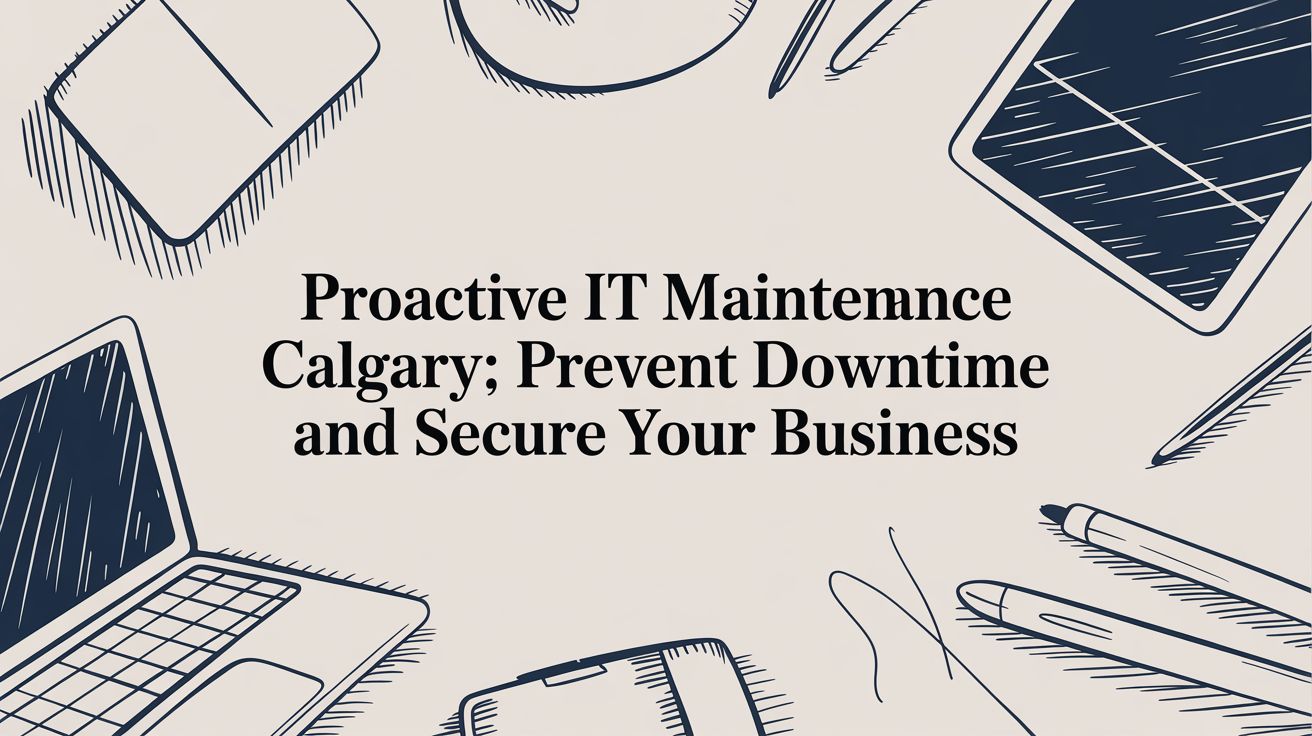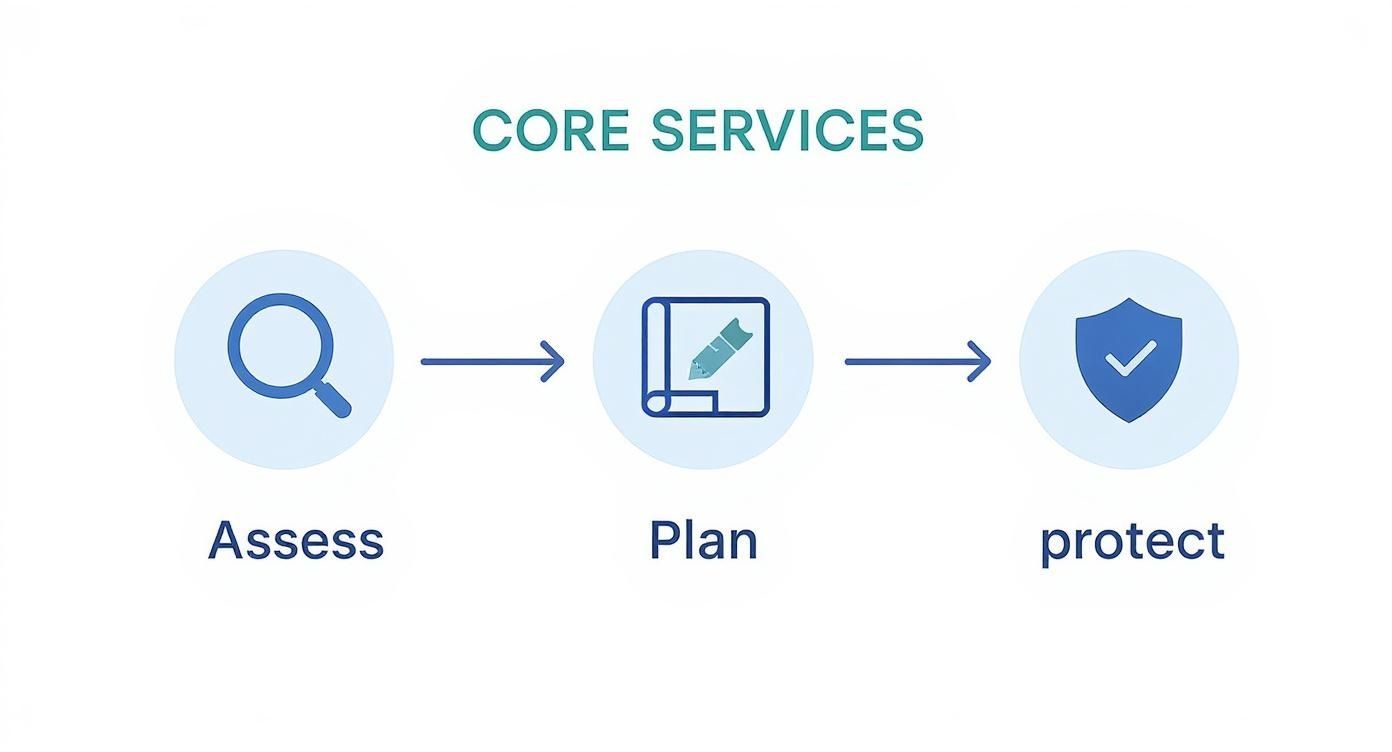
February 3, 2026
Proactive IT Maintenance Calgary: Prevent Downtime and Secure Your BusinessUnlock uptime with proactive it maintenance calgary, delivering secure IT systems and practical strategies for Calgary businesses.
Read Full Post%20(1).webp)
Usman Malik
Chief Executive Officer
November 4, 2025

At its core, cyber security consulting offers expert guidance to help businesses build a rock-solid defence against digital threats. Think of it as bringing in a master architect and a specialized security team for your company's digital fortress. Their job is to find and reinforce every potential weakness before an attack ever happens.

Most medium-sized organizations rely on their in-house IT teams for day-to-day operations—fixing network glitches, managing software updates, and keeping everything running. While essential, these teams are often caught up in constant "firefighting" just to maintain systems. This leaves very little time for proactive, strategic security planning.
This is exactly where cyber security consulting delivers its value. A consultant doesn't replace your IT department; they augment it with specialized expertise. They take a step back from the daily emergencies to analyze your entire security posture, align it with your business goals, and build a resilient, long-term defence strategy.
In a world of increasingly sophisticated threats, reacting to problems as they pop up is a losing game. A consultant helps your organization make the critical shift from a reactive to a proactive security model.
Instead of just patching a vulnerability after it has been exploited, a consultant anticipates threats, identifies systemic risks, and puts controls in place to prevent incidents from happening in the first place. This approach builds a secure foundation that lets you innovate and grow without constantly looking over your shoulder. A key part of this is also securing your physical assets—for instance, understanding how responsible electronics disposal is crucial for preventing data breaches through secure electronics recycling.
The demand for this kind of expertise is skyrocketing. The global cyber security consulting market is on track to hit USD 150 billion by 2033. This growth is fuelled by a massive global talent shortage, with an estimated 4.8 million unfilled cybersecurity jobs. This gap makes it nearly impossible for most businesses to build an adequate in-house team, making expert consulting more critical than ever.
Understanding the distinct roles of your internal team and an external consultant is key to getting the most out of your security investment. While both are vital, they operate with different goals and priorities.
Simply put, your internal IT team keeps the engine running day-to-day, while a consultant designs the roadmap and reinforces the vehicle's chassis for the journey ahead. You can dive deeper into the different types of cyber security services available to businesses in our detailed guide.
To make it clearer, here’s how their functions break down.
Ultimately, both roles are designed to support your business, but they do so from different perspectives. Your in-house team provides essential, immediate support, while a consultant provides the strategic oversight needed to protect your business for the long haul.
When you engage a cyber security consulting firm, you are not just buying a piece of software. You are gaining access to a team of specialists whose entire job is to shield every part of your business from digital threats. These services are not abstract technical fixes; they solve real-world problems like protecting customer data, preventing crippling downtime, and preserving the reputation you have worked so hard to build.
Let's cut through the jargon and break down what these core services actually look like.
Think of your company’s digital footprint—your network, servers, and applications—as your physical office building. A vulnerability assessment is like a detailed building inspection. A consultant uses a mix of automated tools and hands-on analysis to look for known weak spots, like unlocked doors (outdated software), faulty wiring (misconfigured systems), or broken windows (missing security patches). The goal is to map out every potential entry point an attacker could use.
Penetration testing (or pen testing) takes it a giant step further. It’s the digital version of hiring a team of ethical “burglars” to see if they can actually break into your building. Consultants actively try to breach your defences in a controlled, safe way to see how they perform under pressure. This is not just about finding a single weak lock; it is about seeing if a clever intruder could chain multiple small issues together to get inside.
The point is to find and fix these holes before a real criminal does. This is no longer a one-time checkup. We are seeing a major shift away from isolated, once-a-year tests toward ongoing, strategic security programs. For many businesses, especially in regulated industries, regular quarterly or biannual tests are becoming the standard to stay ahead of threats and meet evolving compliance rules.
Let's be realistic: no defence is ever 100% foolproof. That’s why having a solid plan for when things go wrong is just as crucial as trying to prevent them in the first place. An incident response (IR) plan is your fire drill for a cyber attack. It’s a clear, step-by-step playbook that tells everyone exactly what to do from the moment a breach is discovered.
A well-crafted incident response plan is the difference between controlled chaos and a full-blown catastrophe. It empowers your team to act decisively to contain the threat, kick the attacker out, and get operations back online as quickly as possible.
A good plan always covers the essentials:
A huge piece of this puzzle is having solid backup strategies to fight against ransomware and malware, which can dramatically shorten your recovery time and minimize data loss.
Every single device connected to your network—laptops, desktops, servers, and even mobile phones—is an endpoint. And each one is a potential doorway for an attacker.
Endpoint protection is much more than your classic antivirus software. It involves deploying advanced tools that actively monitor what is happening on each device, spot suspicious behaviour, and block sophisticated attacks like ransomware or fileless malware that old-school antivirus would miss.
Consultants help you choose the right tools, roll them out across the entire organization, and manage them so every device stays secure and up-to-date, whether it is in the office or on a kitchen table. It creates a unified defensive wall that is much harder for attackers to punch through. This is just one of the many advanced cybersecurity services that make up a complete defensive strategy.
Navigating the tangled web of industry regulations is a massive headache for most businesses. Whether it’s PIPEDA in Canada, HIPAA in healthcare, or GDPR for handling European data, failing to comply can lead to staggering fines and a shattered reputation.
A cyber security consultant acts as your guide through this maze. They will help you figure out which rules apply to your business, perform a gap analysis to see where you are falling short, and help you implement the security controls and policies needed to get compliant—and stay that way. It is an invaluable service that protects you from legal trouble and proves to your clients that you take their data seriously.
Hiring a cyber security consulting firm might feel like a huge step, but a good process is surprisingly straightforward and collaborative. The whole point is to turn what seems like a complex technical audit into a genuine partnership, one focused on building up your business's resilience for the long haul. It’s a phased approach that moves logically from understanding your current situation to putting the right defences in place and keeping them sharp.
The entire engagement is built on partnership. This is not a one-time deal where a consultant hands you a report and vanishes. Instead, a quality engagement creates a continuous feedback loop. Your team's input is vital at every stage, making sure the final security strategy actually fits your day-to-day operations and business goals.
We can boil this process down to a simple framework: Assess, Plan, and Protect.

As you can see, a successful project always starts with a deep dive into your current state before moving on to smart planning and active defence.
The first step is always discovery. Your consulting partner will kick things off with in-depth conversations to learn about your business—not just your tech stack. They need to get a handle on your goals, your most critical data, the regulatory pressures in your industry, and your overall appetite for risk. This context is what separates a generic, off-the-shelf solution from a security strategy that truly works for you.
From there, the consultant dives into a comprehensive risk assessment. This is a thorough look under the hood of your IT environment, policies, and procedures to pinpoint vulnerabilities and potential attack paths. The key takeaway from this phase is usually a detailed report that prioritizes risks based on their potential business impact, giving you a clear, actionable roadmap.
With a clear picture of your risks, the next phase is all about building the strategy. This is a highly collaborative stage where the consultant works hand-in-hand with your leadership and IT teams to design a security program that fits your budget and company culture. The plan will spell out the specific controls, technologies, and policy updates needed to tackle the risks we identified earlier.
Once everyone is on board with the strategy, implementation begins. The consultant's role can vary here; they might take the lead on the hands-on technical work, or they might guide your internal team through the process. This stage often involves rolling out new security tools, reconfiguring systems, and formalizing new security policies across the organization.
Cyber security is not a "set it and forget it" activity. Threats are always changing, and your business is always evolving. That’s why the final phase of any good consulting engagement is focused on continuous improvement.
An effective security program is a living one. It requires ongoing monitoring, regular testing, and periodic adjustments to remain effective against new and emerging threats. This is where a long-term partnership truly pays off.
This ongoing support includes regular check-ins and reports to keep you in the loop on your security posture, threat intelligence updates relevant to your industry, and periodic reviews to ensure the strategy still aligns with your business goals. For many businesses, this advisory relationship naturally evolves into services like Managed Detection and Response (MDR), where a dedicated team provides 24/7 monitoring and protection.
The growing demand for this kind of expert guidance is clear from market trends worldwide. For example, the Latin America cybersecurity market was valued at USD 21.6 billion in 2024 and is projected to nearly double by 2033, driven by the exact same need for expert help amid increasing digital transformation. This global trend highlights the value of building a lasting, adaptive security partnership.

Trying to justify the cost of cyber security consulting can be a tough sell. It’s easy to look at it as just another line item on the expense sheet—almost like an insurance policy for a disaster you hope never happens. But that perspective misses the bigger picture and the very real, measurable value that a smart security strategy brings to your business.
The key is to shift the conversation away from fear and toward financial sense. The true return on your investment is not just about dodging a catastrophic attack. It’s about paving the way for growth, earning customer trust, and building a more efficient and resilient company from the ground up.
To truly grasp the value of being proactive, you first have to understand the potential cost of doing nothing. A single data breach is not a one-time event; it sets off a domino effect of expenses that ripple through your entire organization, long after the initial technical mess is cleaned up.
When you are putting together the business case for cyber security consulting, think about these potential impacts on your bottom line:
Once you start adding up those numbers, the cost of expert consulting suddenly looks less like an expense and more like a bargain compared to the financial fallout of a successful attack.
While the hard numbers are persuasive, some of the biggest wins from a solid security posture are the ones you cannot easily quantify. These "soft" benefits contribute directly to your success by transforming security from a defence mechanism into a competitive advantage.
A strong security program is not just a shield; it is what gives your business the confidence to move forward and grow.
Investing in security is not just about protecting what you have; it's about creating the confidence to pursue what's next. A strong security posture tells your clients, partners, and employees that you are a reliable and trustworthy organization.
This trust is a powerful driver of growth. When clients feel their data is safe with you, they are far more likely to choose you over a competitor. This is especially true in high-stakes industries like healthcare, finance, and legal services, where security is not just a feature—it's a core requirement.
Ultimately, a strong security posture, guided by expert cyber security consulting, can become one of your most powerful differentiators. It gives you the freedom to adopt new technologies with confidence, explore new markets, and give partners peace of mind that your supply chain is locked down.
To get the ball rolling on your own business case, start by asking these questions internally:
By exploring these questions, you will start to see security guidance not as a cost centre, but as a strategic investment that pays for itself through customer loyalty, operational excellence, and long-term growth.
Not all cyber security consulting firms are created equal, and finding the right partner is one of the most important decisions you will make for your business's security. You are not just hiring a contractor; you are looking for an extension of your team—someone who understands your industry, speaks your language, and is genuinely invested in seeing you succeed.
Making the wrong choice can burn through your budget, leave you with ineffective security measures, and create a dangerous false sense of protection. To choose with confidence, you need a clear way to vet potential partners. It is about looking past the sales pitch and digging into their actual experience, their process, and the real-world qualifications of their team.
Technical skill is the baseline, but a consultant's experience in your specific industry is what separates a good partner from a great one. A firm that already knows the unique regulatory pressures and common threats in sectors like healthcare, manufacturing, or finance can offer guidance that’s immediately relevant and far more effective.
For instance, a consultant specializing in healthcare will be an expert in navigating PIPEDA and PHIPA compliance. One focused on logistics will instinctively understand the risks tied to supply chain management systems.
When vetting a potential partner, don't just ask if they have worked in your industry. Ask them for specific examples of challenges they’ve solved for businesses just like yours. This proves they have practical, hands-on expertise, not just textbook knowledge.
Beyond that, look for a team whose members hold respected industry certifications. Credentials like the Certified Information Systems Security Professional (CISSP) or the Certified Information Security Manager (CISM) are strong signals of a high level of expertise and a commitment to professional standards.
Great cyber security consulting is built on clear communication and trust. A potential partner should be able to break down complex technical concepts into plain English. This helps your leadership team understand the "why" behind their recommendations, not just the "what."
Be cautious of consultants who hide behind a wall of technical jargon. This is often a way to mask a weak strategy or push a one-size-fits-all solution that does not really fit your business at all. A great partner listens first, learns about your business culture, and then tailors their approach.
Their process should be transparent from day one. They need to clearly outline their methodology for assessments, strategy, and implementation, giving you a roadmap of what to expect at every single stage.
As you evaluate different firms, certain warning signs should give you pause. A consultant pushing a specific product right from the start might be more interested in a sales commission than in finding the best solution for you. Likewise, a firm that offers a vague, generic proposal without taking the time to understand your business is unlikely to deliver meaningful results.
Here’s a practical checklist to help you compare potential consulting partners and make an informed choice.
When you are ready to evaluate potential partners, this checklist can help you cut through the noise and focus on what truly matters. Use it to compare firms side-by-side and identify the one that best aligns with your needs.
By using this structured approach, you can systematically evaluate your options and select a cyber security consulting partner who will not only strengthen your defences but also contribute to your overall business resilience and growth.
It is completely normal for business leaders to have a few more questions rattling around before bringing in a cyber security consulting firm. Even after seeing the benefits, you want to be sure. Let's tackle some of the most common ones head-on to help you make a final, confident decision about protecting your business.
This is usually the first question on everyone's mind, and the honest answer is: it depends. The cost of cyber security consulting is not a one-size-fits-all number. It shifts based on a few key things, like the scope of the project, how complex your IT environment is, and any specific industry compliance rules you have to follow.
For example, a one-time project like a detailed penetration test or a compliance audit will come with a fixed price tag. On the other hand, bringing someone in for ongoing strategic advice or on a retainer will typically be a monthly fee. It is not possible to give a flat rate without understanding what you are working with.
A reputable consultant will never just throw a price at you. They will want to do a thorough discovery phase first, investing time to really get to know your business before they even think about sending a proposal. This custom quote will clearly lay out the scope and the costs involved. And remember, it’s always smart to weigh this proactive investment against the potential cost of a data breach—which can easily hit hundreds of thousands of dollars for a medium-sized business after fines, downtime, and recovery.
Absolutely. It is a dangerous myth that small or medium-sized businesses (SMBs) are not on a cybercriminal's radar. The reality is, attackers often go after smaller companies precisely because they assume their defences are weaker. Your business data—from customer lists and financial records to your unique processes—is incredibly valuable, no matter the size of your company.
A consultant can bring in scalable and cost-effective solutions that are a perfect fit for smaller operations. They might start with a foundational risk assessment to pinpoint your most critical vulnerabilities, then move on to implementing essential security controls like multi-factor authentication and endpoint protection. They can also deliver the vital security awareness training your team needs.
Building a secure foundation early on is far more economical than trying to pick up the pieces after a devastating attack. For an SMB, a single breach can be an extinction-level event, making proactive guidance one of the smartest investments you can make.
This is a great question, because the lines can definitely get blurry, and many firms (including us here at CloudOrbis) offer both types of services. The key difference really comes down to their main focus: strategy versus operations.
A Cyber Security Consultant is all about strategic advisory. Think of them as the architects of your security program. Their work involves assessing risk, developing security policies, designing a secure network, and ensuring you are meeting compliance standards. They create the high-level roadmap and provide the guidance to get you there.
A Managed Security Service Provider (MSSP) handles the day-to-day operational management of your security. They are the security detail monitoring the fortress 24/7. Their services include continuous threat monitoring, managing tools like firewalls and endpoint protection, and leading the hands-on incident response the moment an alert goes off.
Many businesses discover that a hybrid model gives them the best of both worlds. You can use a consultant to build the initial strategy and framework, and then lean on an MSSP for the ongoing execution, monitoring, and management. This way, you know your security program is not just well-designed, but it is also being consistently and effectively managed around the clock.
Ready to build a resilient security posture that lets your business grow with confidence? The expert team at CloudOrbis Inc. provides the strategic guidance and hands-on support you need to navigate today's threat landscape. Schedule a consultation today to start strengthening your defences.

February 3, 2026
Proactive IT Maintenance Calgary: Prevent Downtime and Secure Your BusinessUnlock uptime with proactive it maintenance calgary, delivering secure IT systems and practical strategies for Calgary businesses.
Read Full Post
February 2, 2026
A Guide to IT Compliance for the Alberta Oil & Gas IndustryMaster it compliance for alberta oil & gas industry with a practical, click-ready guide on AER/TIER, cybersecurity controls, and audit readiness.
Read Full Post
February 1, 2026
A Guide to IT Compliance Needs for Alberta Private Career CollegesExplore it compliance needs alberta private career college with practical guidance on PIPA, the PVT Act, and core security controls to protect student data.
Read Full Post